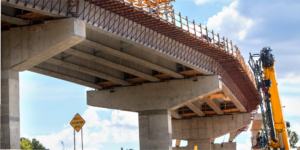
After weeks of negotiations, the House of Representatives is officially sending a $1 trillion infrastructure bill to President Biden’s desk for passage, marking a major win for the construction industry following a protracted period of uncertainty.
The White House is projecting that the bill will add two million jobs per year, jobs that will likely become a major boost for the struggling American construction industry.
“It’s going to create more jobs –- good-paying jobs, union jobs that can’t be outsourced,” Biden added. “This is a blue-collar blueprint to rebuild America. And it’s long overdue.”
Construction industry leaders nationwide have echoed the positivity coming from the White House, hoping that the money in the bill will help to revitalize the outlook for many areas of the industry that have struggled during the pandemic.
“With this legislation, the federal government will restore their critical partnership with cities and states to modernize our nation’s roads, bridges, transit systems, drinking water pipes, school facilities, broadband, ports, airports and more,” said Dennis Truax, President of the American Society of Civil Engineers (ASCE). “Without a strong federal partner, local projects that are community lifelines have hung in the balance, oftentimes being paused or outright canceled due to funding uncertainties.”
Associated Builders and Contractors (ABC) President and CEO Michael Bellaman added “Passage of the bipartisan infrastructure bill creates an opportunity to effectively modernize our nation’s most critical infrastructure, and ABC and our members stand ready to do the important work to bring America’s infrastructure into the 21st century.”
Leaders nationwide are hoping that the plan The White House is hoping that the improvements to the nation’s infrastructure help the country avoid the supply chain issues that have been felt so significantly throughout 2021, with Biden noting that “It’s going to make it easier for companies to get goods to market more quickly and reduce supply chains’ bottlenecks…now and for decades to come.”
Associated General Contractors of America (AGC) CEO Stephen Sandherr agreed, adding that “Because of today’s vote, state and local officials will be able to invest in a more efficient supply chain network. They will also be able to improve roads and bridges to make them safer and more reliable. Metro areas will be able to better maintain and expand transit systems.”
State leaders are applauding the bill’s passage — and already focusing on where to spend the new funds
State leaders who will be working with distributing and managing a lot of the newly-approved funding are looking to put it to good use, as the bill includes staggering amounts of money for major parts of the construction industry.
In a big investment for “hard infrastructure,” the bill will provide $110 billion to repair the country’s highways, bridges, and roads. According to the White House, the nearly $40 billion allocated for bridges is the largest bridge construction investment since the construction of the national highway system.
Ironically, the plan makes a major investment in keeping cars off of the roads, too, with $39 billion for public transit in the legislation that will lead to facility and track expansions — actions that local transit authorities have long been pushing for across the nation.
Leaders in Virginia are especially motivated by transit spending.
“This funding will help support once-in-a-generation investments in Virginia’s infrastructure,” said State Delegate Sally Hudson. “I look forward to working with our state and local leaders to prioritize projects that meet our needs for the long haul. Transit is the single largest source of carbon emissions in Virginia, so we need these investments to support the next era of electric vehicles, trains, mass transit, and more.”
Rail investments won’t just be at the city level, either, as the bill is also going to provide $66 billion to improve the Amtrak rail service. This is going to add to the significant push for improved passenger rail seen nationwide, as part of what the Biden administration is calling the largest federal investment in passenger rail service since Amtrak was founded.
Contractors in the plumbing and wastewater industries will get a boost as well, as the legislation allocates $55 billion for water and wastewater infrastructure — including $15 billion to replace lead pipes and $10 billion to address water contamination.
Officials around the country are seeing the timelines for these projects shrink in the face of the new bill. For example, the city of Cincinnati planned a program to remove all lead pipes in the city, expecting it to take 15 years — but now “[the new infrastructure bill] will allow us to do it more quickly,” according to Jeff Swertfeger, the city’s superintendent of water quality.
“Lead pipes are unpredictable,” added Tom Neltner, chemicals policy director at the Environmental Defense Fund. “One day they can be low and later really high. It may be flow, water chemistry, temperature or something else. That is what makes them particularly hard to manage safely — and why replacing them is so important.”
The bill also allocates $65 billion to improve the state of the nation’s power grid — a topical investment after 2021’s natural disasters in Texas significantly impacted the state’s power grid, necessitating major construction investments — and $25 billion to improve runways, gates, taxiways, and terminals at airports, which follows on the heels of numerous major investments in air travel around the country.